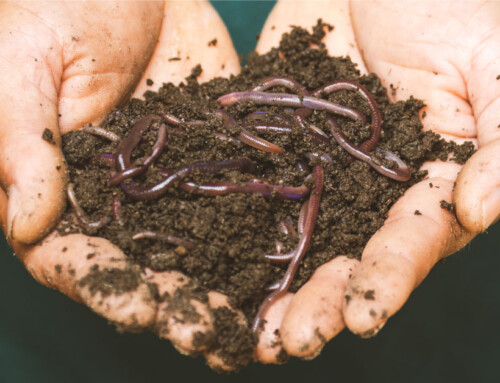The global population is continuously growing and so is the pressure we put on nature. Due to human activities, resources that are crucial for food production, such as healthy soil and clean water supplies are becoming scarce. In fact, according to FAO, about 52% of the world’s agricultural land are already moderately to severely degraded, some to the point farmers have no choice but to abandon the land. One way to meet the increasing demand on the food system while halting further land degradation is through the adoption of Nature-based Solutions (NbS) in agriculture.
Agriculture is one of the biggest ecosystems on our planet, as it covers about half of the world’s habitable land. This ecosystem is essential to maintaining the human population, and when we look into the future, its importance becomes more evident seeing that the global food demand is expected to increase 50% by 2050.
Moreover, the food system is a ten trillion-dollar economy, comprising over 1 billion food producers (e.g. farmers, pastoralists and fish harvesters). A research ran in 2016 showed that 65% of poor working adults made a living through the agricultural sector. This goes to show us how important agriculture is for people’s livelihoods and how its development can be an important tool to reduce poverty.
Although extremely important, agriculture can also be very destructive. And if not managed properly, this activity can do more harm than good in the long run.
Conventional practices used worldwide cause land degradation, water scarcity and biodiversity loss. As a result, the agricultural sector drives more ecosystem degradation than any other industry. In fact, food production is responsible for 80% of native habitat loss. Therefore, implementing sustainable practices is the best way to secure food production and a better future.
Nature-based Solutions in Agriculture
As mentioned in our previous article, NbS are initiatives focused on ecosystem health. Its actions aim to protect, restore, and sustainably manage natural or modified ecosystems. Consequently, addressing social challenges and promoting benefits for humans and biodiversity.
NbS are designed to improve the ecosystem services provided by nature. In agriculture, it can provide numerous benefits such as the restoration of degraded land, improve carbon sequestration and increase crop resilience and productivity.
Many of NbS in agriculture aligns with sustainable farming practices such as regenerative or conservation agriculture. These practices can boost natural processes and support productivity, resulting in yield increase and costs reduction. Thus, proving that these actions can both improve ecosystem health and economically benefit producers.
Furthermore, a research show that protecting nature is more economically advantageous than exploring it. Therefore, farmers can ensure the future of their farming operations and their livelihoods by taking care of nature and harnessing the benefit from its ecosystem services.
Here are some examples of nature-based solutions in agricultural production and their benefits:
- Biochar use: improve carbon storage and soil health.
- Cultivation of cover crops and minimal soil disturbance (reduced-tillage or no-tillage): prevent land erosion and regenerates degraded land. Enhance biodiversity and water retention.
- Nutrient Management: prevent excessive use of fertilizer and other chemicals, reduce greenhouse gas (GHG) emissions and water supply contamination.
- Cultivating trees in croplands: increase habitat values, prevent erosion, provide windbreaks and shelter for crops.
Other Benefits of Nature-Based Solutions
As mentioned before, Nature-based Solutions present numerous benefits for the environment and producers, but beyond that, it can also help us address challenges such as climate change, food security and biodiversity loss. Especially given that NbS are generally cost-effective, long lasting, and easier to scale up.
Climate Change
NbS are considered Natural Climate Solutions as it advances natural process and other actions that increase carbon storage. These actions are crucial if we wish to transition to a carbon-neutral economy by 2050. In fact, studies show that NbS alone can provide 37% of climate change mitigation until 2030 and 20% between now and 2050.
Through the adoption of the agricultural practices previously mentioned, NbS can reduce GHG emissions from food systems, by avoiding deforestation and conserving, restoring, and sustainably managing the land. Additionally, these actions can also promote carbon sequestration, which reduces atmospheric CO2 and increase soil health.
Food Security
Healthy ecosystems are more resilient, especially when facing climate-related hazards, such as weather extremes. NbS increase soil health, water retention, nutrient availability, soil biodiversity and reduce soil degradation. As a result, crop productivity increases allowing farmers to use fewer chemical additives. Creating safer and more nutritious foods.
Biodiversity
Biodiversity is at the core of Nature-based Solutions. These actions enhance ecosystem functions, thus increasing species and habitat diversity. In addition, the restoration of degraded ecosystems is crucial to protect wild fauna and flora enhancing nature’s resilience in the face of climate change.
Turning intention into practice
Nature-based Solutions are the best way forward, and in the long term these actions can lead to economic benefits for farmers, as mentioned before. However, these are not cost-free solutions, and they require system changes.
Although society benefits from the adoptions of NbS (e.g., better air, water, soil, and carbon storage), these benefits do not reflect on the prices of food products. Unfortunately, the market not always value ecosystem services, which means that farmers may not be compensated for promoting these services. In addition, financial incentives currently in place favor unsustainable practices making it harder for producers to make the transition.
This scenario becomes even worse when taking into consideration that 90% of the world’s farms are managed by individuals or families, who generally don’t have the mean to overcome these barriers.
The OECD estimates that subsidies to agricultural practices considered harmful for the environment corresponds to about US$100 B/yr. To increase NbS in agriculture it’s necessary to create better financial resources to facilitate its adoption and discourage harmful practices. Additionally, it will require action from different actors, including corporate actors, investors, policy makers and farmers.
There are some international frameworks that encourage and guide countries in implementing NbS; however, every region has its own particularities, such as climate risks, cultural characteristics, and different social and economic realities. For this reason, it is important to accelerate local and regional strategies. For example, policy makers and agricultural sector leaders can implement public interventions and private investments to help the transition to a Nature-based agriculture.
Numerous research and case studies have reported the benefits of NbS, but we have not yet seen the application of these actions in agriculture at a global scale. Given the huge influence that food production has on climate, the environment and human health, it’s crucial to adopt sustainable practices and accelerate opportunities for NbS, thus closing the gap between theory and practice and ensuring safe and reliable food supplies for the future generations.
Below there are some other articles that you might be interested in:
- What is the UN Decade on Ecosystem Restoration?
- Soil Biodiversity: Contributions and Threats
- Comparing Agricultural Practices and Their Impact on the Environment





Leave A Comment